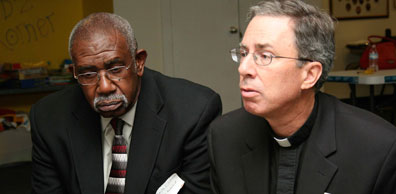
 COLUMBIA—Christians who are confused about the issue of immigration can find guidance in the Bible, according to participants at the Lutheran, Anglican, Roman Catholic and United Methodist Bishops’ Dialogue.
COLUMBIA—Christians who are confused about the issue of immigration can find guidance in the Bible, according to participants at the Lutheran, Anglican, Roman Catholic and United Methodist Bishops’ Dialogue.
On Oct. 17, Bishop Robert E. Gu-glielmone joined three other South Carolina bishops, and about 45 members of the clergy, women religious and lay people in discussing ways to respond to immigrants’ needs and advocate for reforms to federal immigration policy. It was held at the Lutheran Theological Southern Seminary.
Talks focused on how a Christian voice is needed in the debate more than ever now that states including Arizona, Georgia, and most recently Alabama have enacted strict immigration laws leading undocumented people, especially Hispanics, to either flee those states or live in fear.
Participants said South Carolina’s tougher immigration law has some Hispanics afraid to drive to religious services, shop or go out at night because they fear being arrested and deported. The worry makes life especially difficult, they said, for undocumented people who have spouses, children and other family members who are citizens.
Discussion during the day focused on the tough balancing act facing church leaders when it comes to immigration. They have to acknowledge people in the pews who favor tough laws, but also find a Christian way to respond to the needs of immigrants in the congregation and those in the community who need help.
Joan Maruskin, religious service program administrator for the Church World Service, talked about how the Bible deals with the issue of treating newcomers and foreigners with compassion. She offered examples of Scripture from the Old and New Testaments, and spoke about key people in the Bible who were themselves migrants, travelers and captives, including Abraham, Moses, Joseph and the entire Hebrew nation in the Old Testament.
“We see in many parts of the Bible God’s mandate to care for strangers,” Maruskin said. “Biblical hospitality stresses welcoming the stranger. We need to ask, ‘Are our actions as a nation closer to that of the Hebrews or of Pharoah who held them captive in Egypt?’”
The story of Jesus’ life includes many episodes when he and the disciples were strangers in a new place.
“Jesus insisted that the law of love take precedence,” she said. “He says you welcome the stranger and take care of those in need. Our salvation is tied up with taking care of those in need.”
Bishop Guglielmone said the conference was a good start in addressing the issue, and especially important for him because the majority of Hispanic immigrants are Catholic.
He said there must be a balance between acknowledging the need to secure the borders and reform immigration laws, and treating all people, whether legal or undocumented, with dignity and compassion.
“We have to see the human needs of these people and try to assist them with those needs,” he said. “We also need a federal immigration program that’s realistic.”
The bishop said it was especially useful to consider Jesus’ life when responding to immigration issues.
“Jesus, Mary and Joseph had to leave their native country and flee to Egypt,” he said. “Jesus himself was a stranger in a new land, and he indicated in his teachings that we should be welcoming to the stranger.”
